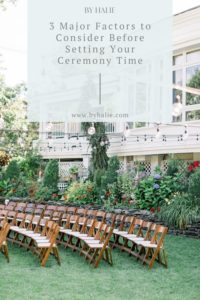When it comes to creating your wedding day timeline there are three main factors that all couples need to take into consideration before finalizing their ceremony time. With some foresight, couples can optimize their day to get the most out of their venue, available lighting, and potential dance time!

The 3 Factors to Consider When Picking Your Ceremony Timing
Your Venue
First and foremost, the venue must be considered. All wedding venues have different rules when it comes to how long you’re able to occupy the space and how late you’re able to go until. Refer back to your contract and double-check timing with your onsite coordinator. In Massachusetts, state liquor laws limit alcohol service to five hours at any one event. This may be a consideration along with the timing you’re allowed to be at your venue. Some private estate venues will allow you full access to the venue for the day, giving more timing flexibility.
Sunset
The first thing I check when speaking to a new couple about their wedding, is sunset time! Since my couples tend to love natural light photography, it’s important that we plan their timeline around the time that the sun sets and I need to switch over to artificial flash lighting. Sunset varies based on time of year and location, but a quick Google search for, “[Date] [City] sunset time” will tell you what to plan for (and automatically take daylight savings into account).
When possible, I generally recommend planning your ceremony 90-120 minutes before sunset. Of course, in the middle of summer when sunset can be as late at 8:30 pm here in New England, that may need to be adjusted slightly to best fit your ideal end time or venue restrictions. And if you aren’t planning to do a first look, be sure to take into account how long you’ll need for photos after your ceremony. When you do have some flexibility, think about where you want your guests to be during sunset. Would you prefer sunset to happen at the end of cocktail hour and then your whole reception be photographed using artificial light? Alternatively, maybe you plan for sunset to happen while guests are eating so that the entire front portion of your reception is in natural light but all of the dancing happens once it’s dark outside?
Seasonality
Similar to sunset, seasonality will also change throughout the year and have an impact on the ideal ceremony time for your wedding. If you’re planning to be married outside, a mid-day ceremony in the middle of summer won’t be entirely ideal for your guests’ comfort. Likewise, for a late fall or winter wedding, you may decide to move the ceremony time up earlier in the afternoon to keep guests warmer. Depending on where your wedding is taking place, you may also consider insect seasonality. Working with your planner you’ll be able to counteract this some, but it may not be ideal to force guests into sitting outside during peak mosquito hour if you’re considering a sunset ceremony.
Planning your full timeline? Check out these tips for planning your wedding timeline — with full samples and tips for creating your own!
comments +